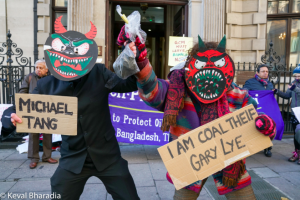 12th December 2017. Despite the cold, a loud and theatrical protest was again held outside the AGM of British mining company Global Coal Resources Management (GCM) at the Aeronautical Society in 4 Hamilton Place in London at 10am today. In solidarity with the communities in Phulbari, where three people were shot dead as paramilitary officers opened fire on a demonstration of 80,000 people in 2006, protesters reaffirmed that they will not sleep until GCM is ousted from Bangladesh. A parallel protest followed by a press conference was held in Phulbari against the plans by GCM, an AIM-listed company who want to build a massive open cast coal mine by forcibly displacing 130,000 people in Phulbari, northwest Bangladesh. Inside the AGM in London, dissident shareholders asked questions on behalf of the communities in Phulbari and Dinajpur by accusing the company of human rights abuses as the CEO of the company has filed multiple arbitrary charges against 26 frontline defenders, indigenous farmers, small entrepreneurs and local leaders who opposed the mine.
12th December 2017. Despite the cold, a loud and theatrical protest was again held outside the AGM of British mining company Global Coal Resources Management (GCM) at the Aeronautical Society in 4 Hamilton Place in London at 10am today. In solidarity with the communities in Phulbari, where three people were shot dead as paramilitary officers opened fire on a demonstration of 80,000 people in 2006, protesters reaffirmed that they will not sleep until GCM is ousted from Bangladesh. A parallel protest followed by a press conference was held in Phulbari against the plans by GCM, an AIM-listed company who want to build a massive open cast coal mine by forcibly displacing 130,000 people in Phulbari, northwest Bangladesh. Inside the AGM in London, dissident shareholders asked questions on behalf of the communities in Phulbari and Dinajpur by accusing the company of human rights abuses as the CEO of the company has filed multiple arbitrary charges against 26 frontline defenders, indigenous farmers, small entrepreneurs and local leaders who opposed the mine.
A full report of the AGM proceedings from dissident shareholders can be found here: Flogging a Dead Horse: the 2017 GCM Resources AGM
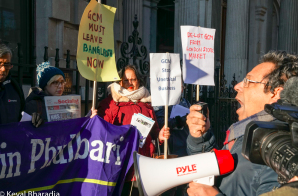 Climate activists and community defenders under the banner of Committee to Protect Resources of Bangladesh and Phulbari Solidarity Group , calling for three-point demands, blocked the pavement at the main entrance of the Aeronautical Society for two hours. They demanded that GCM’s CEO, Gary N Lye, must withdraw all cases against activists in Bangladesh with immediate effect; that GCM must stop selling shares in the name of Phulbari project in London’s Alternative Investors Market, and that GCM must Leave Bangladesh immediately. The demo ended with a comedy coal show where activists wearing masks of coal thieves, Gary N Lye (CEO of the company) and Michael Tang (the Chairman of the company) attacked a Bangladeshi woman holding coal from Phulbari. Protesters forced the maskmen to leave the premises and sang Phulbari jingles against coal mine: “your home and my home, Phulbari Phulbari”.
Climate activists and community defenders under the banner of Committee to Protect Resources of Bangladesh and Phulbari Solidarity Group , calling for three-point demands, blocked the pavement at the main entrance of the Aeronautical Society for two hours. They demanded that GCM’s CEO, Gary N Lye, must withdraw all cases against activists in Bangladesh with immediate effect; that GCM must stop selling shares in the name of Phulbari project in London’s Alternative Investors Market, and that GCM must Leave Bangladesh immediately. The demo ended with a comedy coal show where activists wearing masks of coal thieves, Gary N Lye (CEO of the company) and Michael Tang (the Chairman of the company) attacked a Bangladeshi woman holding coal from Phulbari. Protesters forced the maskmen to leave the premises and sang Phulbari jingles against coal mine: “your home and my home, Phulbari Phulbari”.
Dissident shareholders inside the AGM poured scorn on GCM’s 2017 Annual Report which claims that the company “Continued to make progress with principle partner China Gezhouba Group International Engineering Co Limited (CGGC, ultimately owned by China Gen Engineering Ltd.). […] Working on proposal for mine mouth power plant to provide integrated power solution for government of Bangladesh.” The company claims, overlooking the declining of share price over the last month from £43.00 on 14 November to £26.38 today, that “Last month [it] raised 2m pounds before costs enabling all shareholders to participate and to enable GCM to continue pursuing strategy of joint mine and power plant proposal.” The report concludes by acknowledging “There are significant challenges ahead, not least achieving approval to go ahead. [Still believe to be] in the right direction and hopes to continue momentum into New Year.” Shareholders condemning the report say that it represents a poor attempt to cover up the fact that they lost credibility and market confidence. The company has been drowning in bank loans, still borrowing money and facing continuous loss. GCM was again found violating human rights and disregarding the UN Guiding Principles on Business and Human Rights at the UN Forum on Business and Human Rights Report 2017.
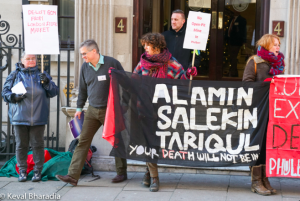 The UN Forum on Business and Human Rights is the global platform for yearly stock-taking and lesson-sharing on efforts to move the UN Guiding Principles on Business and Human Rights from paper into practice. The Phulbari case was highlighted at the 6th UN conference held on 27-29 November 2017 in Geneva and GCM’s failure was noted in Annual Report of UNFBHR 2017. Shareholders also note the Bangladesh government has not given the company the go-ahead because of a lack of a “social licence to operate” in Phulbari and anywhere else in Bangladesh. There was also an OECD complaint about GCM failing to keep obligations. An internal review of the UK governments investigation affirmed that the OECD 2011 guidelines do apply to human rights abuses that would occur if the project went ahead. GCM’s Board of Directors failed to respond to shareholders scrutiny. Today’s meeting ended in a rush, lasting less than an hour, as the Board was exhausted by questions.
The UN Forum on Business and Human Rights is the global platform for yearly stock-taking and lesson-sharing on efforts to move the UN Guiding Principles on Business and Human Rights from paper into practice. The Phulbari case was highlighted at the 6th UN conference held on 27-29 November 2017 in Geneva and GCM’s failure was noted in Annual Report of UNFBHR 2017. Shareholders also note the Bangladesh government has not given the company the go-ahead because of a lack of a “social licence to operate” in Phulbari and anywhere else in Bangladesh. There was also an OECD complaint about GCM failing to keep obligations. An internal review of the UK governments investigation affirmed that the OECD 2011 guidelines do apply to human rights abuses that would occur if the project went ahead. GCM’s Board of Directors failed to respond to shareholders scrutiny. Today’s meeting ended in a rush, lasting less than an hour, as the Board was exhausted by questions.
Today’s protest echoed the demands made by the National Committee to Protect Oil, Gas, Port-Power and Mineral Resources in Bangladesh . Activists from 12 grassroots organisations, including Coal Action Network, Grow Heathrow, Foil Vedanta, South Asia Solidarity Group, K M Protectors (North-east England), Communist Party of Bangladesh – UK branch, Bangladesh Socialist Party, UK branch, Reclaim the Power, London Mining Network, Plane Stupid, and the Socialist Party of England and Wales, joined the protest outside or inside the AGM.
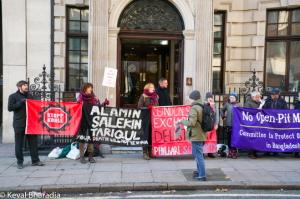 Global Coal Management, formerly known as Asia Energy, has been allegedly involved in abuse and harassment of opponents of the proposed Phulbari mine. Media reports on the brutal death of Nasrin Huq, the former executive director of Action Aid, revealed that Huq was killed brutally in her car park because of her strong opposition to the project.i Later in August 26 in 2006, three people were shot dead and two hundred injured in a demonstration of 80,000 people who marched against plans by the company. It has been 11 years since the powerful resistance in the aftermath of the shooting against an open-cast mine in Phulbari has put a decade long halt to the project. Government has cancelled the company’s license but the company has been pushing the government to give them a go ahead.
Global Coal Management, formerly known as Asia Energy, has been allegedly involved in abuse and harassment of opponents of the proposed Phulbari mine. Media reports on the brutal death of Nasrin Huq, the former executive director of Action Aid, revealed that Huq was killed brutally in her car park because of her strong opposition to the project.i Later in August 26 in 2006, three people were shot dead and two hundred injured in a demonstration of 80,000 people who marched against plans by the company. It has been 11 years since the powerful resistance in the aftermath of the shooting against an open-cast mine in Phulbari has put a decade long halt to the project. Government has cancelled the company’s license but the company has been pushing the government to give them a go ahead.
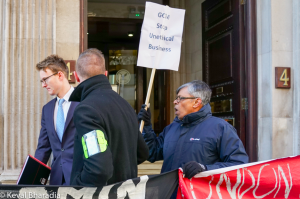 Rumana Hashem, the PSG spokesperson and an eye witness to the Phulbari outburst in 2006, said:
Rumana Hashem, the PSG spokesperson and an eye witness to the Phulbari outburst in 2006, said:
“the company is abusing our people and criminalising society in Bangladesh. We will hold them to account here. We will not give up until London Stock Exchange de-list GCM. We will ensure that this company could never go back to Bangladesh.’”
Akhter Sobhan Khan of Committee to Protect Resources of Bangladesh said that:
“The company does not have a valid contract with Bangladesh; nevertheless they are selling shares in the name of Phulbari project. London Stock Exchange must de-list GCM as they are doing deceitful marketing of the project”.
If the mine is built, it would not only displace 130,000 families of farmers in Phulbari but also would destroy 14,600 hectares of highly cultivable land, would pose threats to clean water resources and would leave devastative impact on one of the world’s largest mangrove forests and UNESCO heritage site, the Sunderbans. In February 2012, seven UN rapporteurs expressed grave concerns to the project, and at national and international level. The UK National Contact Point has acknowledged the strong opposition to the project in an assessment in 2015.
i The mystery death of Nasrin Huq – a report to which the company was not able to respond, was derived from
http://www.guardian.co.uk/world/2006/sep/03/bangladesh, last cited on 01. 01. 2013